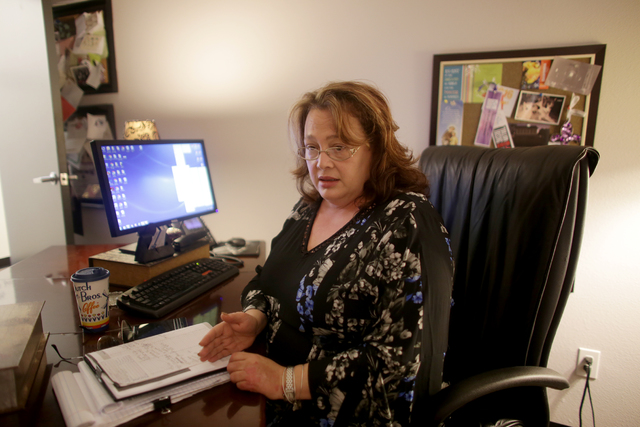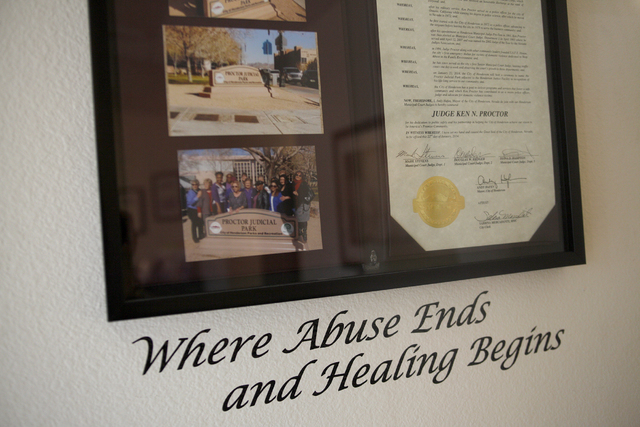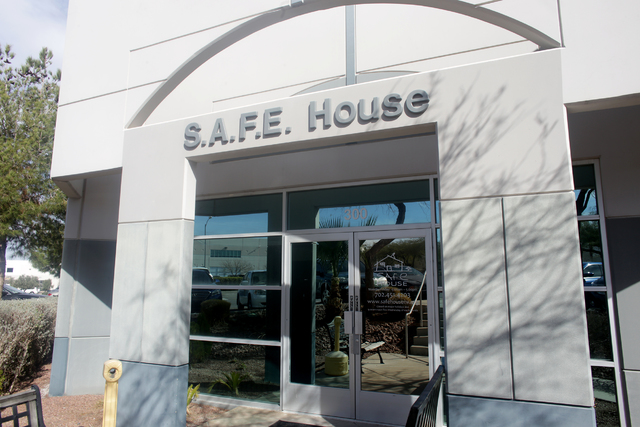Abuse among dating teens is tough to detect, adults warned




Teenage abuse and assault victims tend to be less likely than adults to ask for help, said Annette Scott, director of advocacy at S.A.F.E House in Henderson.
“Teens think they can handle it themselves,” she said.
Scott and several advocates from other organizations, including the Rape Crisis Center, Safe Nest and The Shade Tree, are spreading the message during Teen Dating Violence Awareness Month in February.
“Teen dating violence can become very complicated because there are not a lot of services for teens,” she added.
Nearly 1.5 million high school students nationwide are physically abused by a dating partner in a single year, according to Love is Respect, an organization formed by the National Domestic Violence Hotline in 2007. One in 3 adolescents in the U.S. is a victim of physical, sexual emotional or verbal abuse from a dating partner, the group states.
A 2011 Centers for Disease Control and Prevention survey found that 23 percent of females and 14 percent of males who had been victims of rape, physical violence or stalking by an intimate partner had first been abused between ages 11 and 17.
State lawmakers are set to hear a proposed bill by Nevada’s Youth Legislature, which includes 21 high-schoolers, to change sex-education standards. The bill, created by 15-year-old Coronado High student Olivia Yamamoto, would include discussions of consent in high school government classes.
IDENTIFYING UNHEALTHY RELATIONSHIPS
The first step that organizations teach to combat teen dating violence is recognizing what constitutes a healthy relationship.
Unhealthy relationships — intimate or not — include name calling, controlling behavior, dishonesty, lack of respect for boundaries, emotional or psychological abuse, and physical or sexual violence.
Receiving flowers can be romantic, Scott said, but if they come from someone you have ended a relationship with or don’t feel comfortable around, it becomes an issue.
Parents should pay attention to whether their children become isolated, if their partner is calling and texting overly persistently, if they argue with their partner or if they have signs of physical abuse.
Because these signs can show up as early as middle school, advocates are making preteens aware of teen dating violence, Rape Crisis Center Executive Director Daniele Dreitzer said.
The Rape Crisis Center in Las Vegas holds a 12-week support and therapeutic program for teens affected by assault or abuse. It is accepting applications for the session that begins in March. The organization also recently created a session for ages 11 to 14.
S.A.F.E. House holds a dating council for teenagers interested in giving presentations and talking to their peers about teen dating violence in their schools.
DIFFICULT DYNAMIC
Two groups that have the biggest influence on teenagers are the adults in their lives and their peers, Scott said. Adults should avoid dismissing teenagers’ feelings by saying they are too young to know what love is, she said.
“When somebody is in a relationship as a young person, everything they experience in their young life is a first,” Scott said. “Everything that is a first is exciting. When young people say ‘I love somebody,’ they really do feel that way because it’s the first time they’ve felt these intense emotions.”
Teen dating violence mimics adult violence, Scott said, which can be difficult for parents to cope with.
“For some, they’re horrified that this could be happening to their child because it’s so adult-like,” she said.
For that reason, the Rape Crisis Center holds a support group to counsel parents whose children have been abused or assaulted.
The center also has a school-based advocate who works with parents on how to address abuse or assault issues.
Bullying also plays a role in teen dating violence, Scott said.
“If you start to address unhealthy relationships at a very young age and know what a healthy relationship looks like, then you have a better chance of lower intimate partner violence …” Scott said.
To reach View intern reporter Kailyn Brown, call 702-387-5233 or email kbrown@viewnews.com. Follow @KailynHype on Twitter.
Resources
Call 9-1-1 if you are in immediate danger
Rape Crisis Center
Hotline: 702-366-1640
Office: (702) 385-2153
801 S. Rancho Drive, Suite B-2
Las Vegas, NV 89106
S.A.F.E House
Hotline: 702-564-3227
Office: 702-451-4203
921 American Pacific Dr. Suite 300
Henderson NV 89014
Website: http://safehousenv.org/
Safe Nest
Hotline: 702-646-4981 and 800-486-7282
Office: 702-877-0133
2915 W. Charleston Blvd., Suite 12
Las Vegas, NV 89102
Shade Tree
Office: 702-385-0072
1 W Owens Ave
North Las Vegas, NV 89030
Additional Resources
VINE Hotline: 1-888-2NV-VINE (VINE is a free, anonymous, 24-hour, computer-based telephone service provided by the State of Nevada)
Nevada Domestic Violence Hotline 1-800-500-1556
National Domestic Violence Hotline 1-800-799- SAFE (7233)













